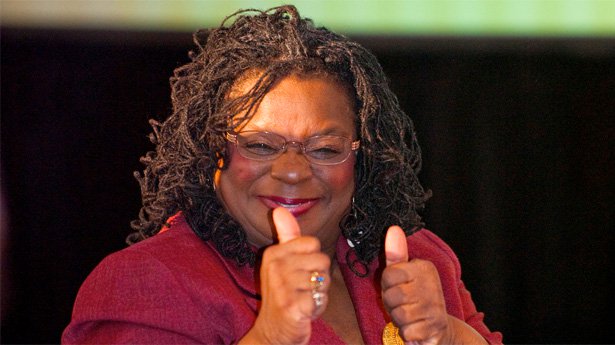In the wake of a deadly white supremacist rally in Charlottesville, Va., over the weekend, a number of Democrats have called for President Trump to purge the nationalist voices in the White House.
On Tuesday, Rep. Gwen Moore (D-Wis.) took that argument a long step forward, urging the removal of Trump, as well.
Moore, a member of the Congressional Black Caucus, said Trump’s remarks on Tuesday defending some of the white supremacist protesters in Charlottesville — while blaming counterprotesters, in part, for the eruption of violence that left one counterprotester dead — is evidence enough that Trump is unfit to serve as president of a country derived of multiculturalism.
As we once again hear Donald Trump defend those responsible for the deadly riot in Charlottesville and receive praise by hate groups like the KKK and neo-Nazis, the time has come for Republicans and Democrats to put aside our political differences and philosophical debates for a higher cause,” Moore said in a brief statement.
“For the sake of the soul of our country, we must come together to restore our national dignity that has been robbed by Donald Trump’s presence in the White House,” she added. “My Republican friends, I implore you to work with us within our capacity as elected officials to remove this man as our commander-in-chief and help us move forward from this dark period in our nation’s history.”
Moore is not the first Democrat to call for Trump’s ouster. Rep. Maxine Waters (D-Calif.) has suggested for months that Trump is unfit to serve as commander in chief. And earlier in the summer, Reps. Brad Sherman (D-Calif.) and Al Green (D-Texas) introduced articles of impeachment against the president.
The violence in Charlottesville — and Trump’s uneven response — has led to a new wave of condemnations from Democrats who have long accused the president of protecting the white nationalist voices that flocked to his campaign.
Trump poured fuel on those accusations on Tuesday in defending his initial response to the violence — in which he declined to name the white supremacist and neo-Nazi groups involved — and amplifying his early judgment that both sides of the protest bear the blame.
“You had a group on one side that was bad, and you had a group on the other side that was also very violent,” Trump said from Trump Tower in Manhattan. “Nobody wants to say that. But I’ll say it right now.”
Lawmakers on both sides of the aisle were quick to admonish the president, denouncing the white supremacist movement in no uncertain terms.
House Minority Leader Nancy Pelosi (D-Calif.) said Trump’s equivocal reaction “ignores the abhorrent evil of white supremacism.” And Speaker Paul Ryan (R-Wis.) said Congress ”must be clear” that “white supremacy is repulsive … [and] counter to all this country stands for.”
“There can be no moral ambiguity,” he said on Twitter.
The white nationalist groups that participated in Saturday’s march, meanwhile, have been emboldened by Trump’s remarks. David Duke, a former KKK leader, thanked the president for his “courage to tell the truth … and condemn the leftist terrorists.”
Such support was not overlooked by the Democrats, who are launching a new round of accusations that Trump is sheltering the most fringe elements of his base at the expense of the rest of the country.
“I never thought I would see the day when the president of United States would openly defend white supremacists,” said Rep. Cedric Richmond (D-La.), chairman of the Congressional Black Caucus.
“I call on my colleagues on both sides of the aisle to hold this president accountable.”
